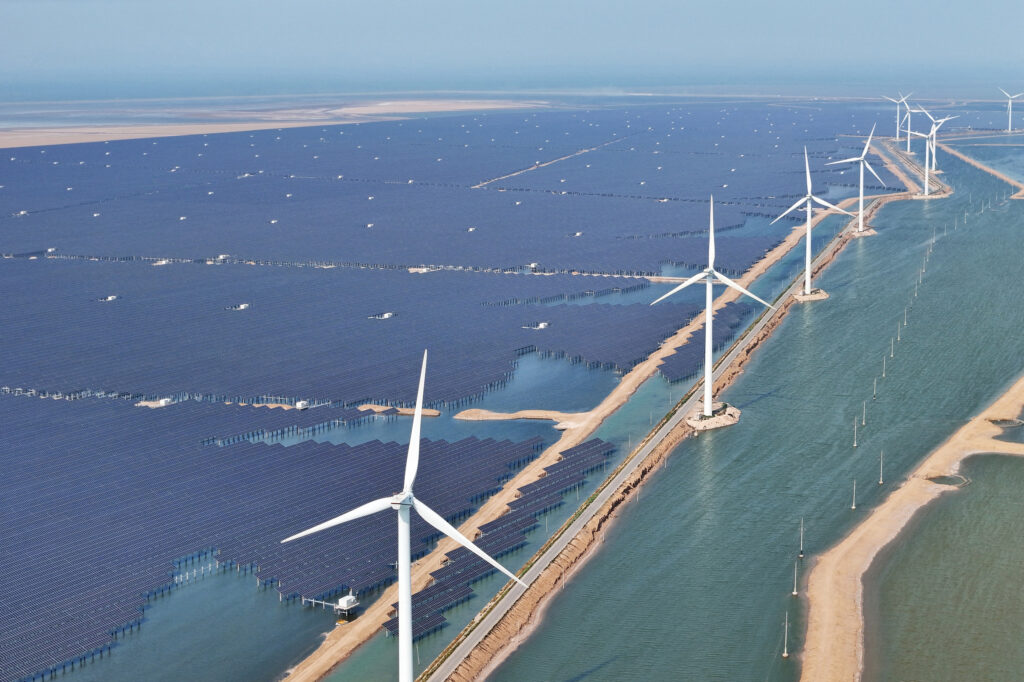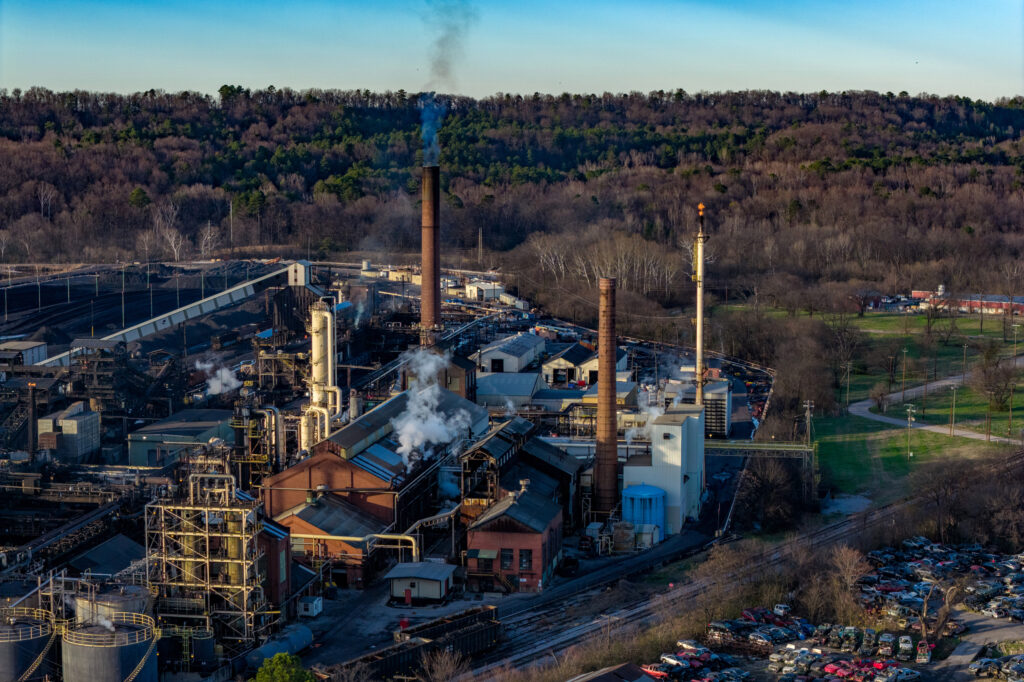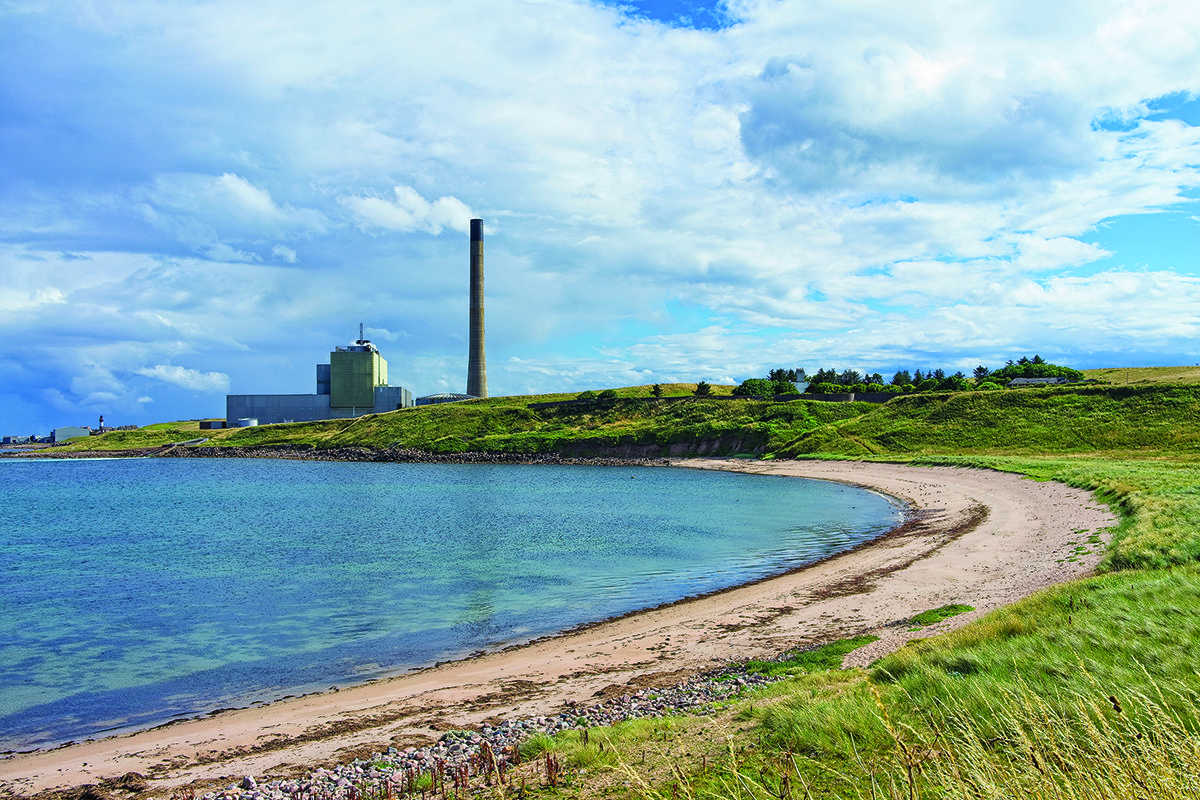Based on their records and rhetoric, one candidate seeking to be the next governor of West Virginia supports a broad-based energy policy, from coal to renewables. And the other is laser-focused on fossil fuels.
West Virginia electricity generation is still as much as 90 percent coal-powered even as coal mining here and in other states has waned amid competition with cheaper natural gas, solar and wind—and concerns about the climate crisis.
Still, Republican gubernatorial candidate Patrick Morrisey, the state’s attorney general, has made perpetuating the mining and burning of coal and the support of the state’s natural gas industry a priority through aggressive litigation. The Democrat in the race, Huntington Mayor Steve Williams, who has overseen an economic recovery in the state’s second-largest city, told the Mountain State Gazette in May that he sees a need to support renewable sources such as wind and solar in addition to natural gas and coal. He said he wants West Virginia to be known as an “energy state,” not merely a “coal state.”
Other issues, including reproductive health and abortion access, a crisis in the state’s foster care system and the scourge of an ongoing opioid epidemic, will likely be on voters’ minds this fall. But in the end, what the candidates say about energy policy or anything else may not matter. It may all come down to how voters feel about former President Donald Trump, the presumptive Republican nominee running against President Joe Biden, the Democrat, whom Trump beat in this state by nearly 40 percentage points in 2020.
Explore the latest news about what’s at stake for the climate during this election season.
In 2016, Trump beat former Secretary of State Hillary Clinton here by about the same margin.
“He’ll carry the state again by a very wide margin,” said Hoppy Kercheval, the longtime host of a popular talk show on the Metro News Radio Network in West Virginia. A political commentator, he said he’s not endorsing either candidate.
“Patrick Morrisey makes sure that everybody understands that he’s endorsed by Donald Trump,” he said. “So that is another huge advantage that Morrisey has that will be very difficult for Steve Williams or any Democrat to overcome. And that’s where that race begins before you even talk about any of the issues.”
Will Manchin Jump in?
Democrats had a lock on West Virginia politics from the Depression through the 2014 election, marking a dramatic shift to the GOP. Former governor and U.S. Sen. Joe Manchin is the last Democrat to hold statewide office, and he’s retiring this year.
Manchin, who recently left the Democratic Party and declared himself an independent, endorsed Williams and is helping him raise funds. But that hasn’t stopped speculation that Manchin may yet enter the governor’s race. While polling shows Morrisey in the lead in a theoretical matchup between the two men, it also suggests Manchin could have a chance. Facing an Aug. 1 deadline to decide, Manchin has so far said he’s not interested.
“There’s a concern that Steve Williams is a very big long shot, and that he will have trouble raising the kind of money and putting in the kind of effort necessary to win the race,” Kercheval said. “I don’t think it’ll happen. But Manchin loves being in the middle of things, and he loved being governor.”


As of late June, Williams had raised a paltry $31,000, with $30,000 still to spend. Morrisey has taken in $3.6 million, with $695,000 in the bank after surviving a bruising primary election. Manchin’s leadership political action committee shows a balance of $8.5 million.
The Williams campaign knows the obstacles it faces.
“It takes money, and because we’re a red state, a deeply red state, that’s always a challenge,” said Mike Plante, a longtime Democratic Party consultant in West Virginia who is working with Williams.
But Williams, whose business career was in banking and finance, is supported by a committee that includes Republicans and Democrats who believe his experience and work ethic would bode well for the economy of West Virginia, Plante said.
“Steve has a track record of success that has improved the economy in Huntington, and they want to see that kind of leadership in West Virginia,” Plante said. “So, it’s up to the Williams campaign to harness that and to raise the money together to tell that story.”
Energy Strategy at Stake
West Virginia’s historic coal-based economy put food on miners’ tables. It helped build cities and win wars. Owners and investors of coal mining companies got rich. And coal infused the state with a culture and identity.
But as the industry has waned, it’s left behind ecological destruction including flattened and unreclaimed mountains, polluted streams as orange as traffic cones and sick, impoverished communities.
“Mountaintop removal is the gift that keeps on giving because you can never put them back,” said Gary Zuckett, executive director of West Virginia Citizen Action, a consumer protection and environmental justice organization. “They can push the dirt up the side of their land and plant a little grass, but it will take generations to establish any kind of forest back there.”
Part of the state has also seen a boom in oil and gas using relatively new horizontal drilling and fracking methods. That too has created ongoing environmental and health concerns. A 2021 Ohio River Institute study, updated in 2023, also concluded that despite producing economic activity, the fracking boom largely failed to bring the things that help people and local communities the most: jobs, personal income gains and population growth.
Whoever wins in November will also oversee the state’s regulation of so-called “zombie” coal mines that companies shut down without rehabilitating the land as required, leaving behind scarred landscapes that pose ongoing health and safety risks. And the state’s decision to double down on coal has resulted in soaring electric utility rates, Inside Climate News has found.


“The question is what kind of energy state do we want to be?” asked Ted Boettner, a West Virginia-based senior researcher at the Ohio River Valley Institute, a think tank focused on a sustainable, equitable and prosperous Appalachia.
Using a term popularized by politicians, Boettner said that Williams has an “all of the above” energy strategy. Morrisey, he added, “is sort of ‘some of the above,’ basically coal and natural gas.”
Zuckett, who favors Williams in the race, agreed. For too long, he said, state politicians’ message to voters has been delusional about the future of coal. “They’ve been told over and over again, ‘Coal is coming back, coal is gonna save us’—but that ain’t going to happen.”
Morrisey Fights Against Climate Rules
Morrisey, a New Jersey native, is a lawyer who has worked in the U.S. House of Representatives for the Energy and Commerce Committee and as a lobbyist. Opponents in the Republican primary resurfaced his history as a pharmaceutical lobbyist and his handling of West Virginia’s opioid lawsuit settlements, a controversy that gained national attention in a 2016 CBS News report.
Morrisey, whose staff declined requests for an interview, defended his record on opioids on his campaign website, taking credit for “more than $712 million in settlements with opioid manufacturers, distributors, pharmacies, and marketers.”
He’s served 12 years as attorney general and has become something of a showhorse among Republicans nationally. He’s led or participated with other states in legal challenges against regulations for clean air, clean water and other matters. That included leading a 27-state coalition that asked the U.S. Supreme Court to overturn its decades-old precedent that has defined the bounds of federal rulemaking.
The high court ruled as Morrisey requested on June 28, divided 6-3 along ideological lines. The justices set aside a 40-year-old case involving the U.S. Environmental Protection Agency that held that when the meaning of a law is disputed, the federal agency’s interpretation should be given deference as long as it is reasonable. The “Chevron doctrine” was on the agenda of right-wing groups for years, and environmental advocates fear losing it will make it easier for courts to block new pollution regulations, such as those addressing climate change.


In a written statement, Morrisey praised the ruling, saying that under Chevron, courts deferred “to legally dubious interpretations of statutes put out by federal administrative agencies.”
He also led a challenge of former President Barack Obama’s Clean Power Plan, which had sought greenhouse gas reductions from power plants through action by EPA.
Morrisey’s lawsuit in that matter, filed soon after Biden took office as president, was an unusual gambit because no regulations were in place that could be said to be causing harm to any party.
The Clean Power Plan had never taken effect and the Biden administration had made it clear it did not intend to revive it—the deadlines had passed and its emissions goals had been met.
“The Clean Power Plan was a dead horse, and the Supreme Court did not need to beat it again,” wrote Georgetown University Law Professor Lisa Heinzerling in a recent law review article. But the Supreme Court, then recently fortified with its third Trump appointee, opted to take the case to embrace a new legal doctrine that weakens federal agencies’ legal authority when the case involves a “major question” of national policy.
Morrisey’s move, timed to take advantage of the court’s increasing rightward tilt, gives energy companies and other regulated industries an advantage in future challenges of federal agencies.
Morrisey is also leading challenges to the Biden administration’s new EPA greenhouse gas rules on coal and natural gas power plants as well as tailpipe pollution standards for passenger vehicles.
“We need to keep fighting to protect coal and our natural gas, and our fossil fuels we have, because if we don’t, West Virginia will suffer at a level you can’t possibly describe,” Morrisey told West Virginia television station WCHS in April. The goal, he said, is to corral what he called “the swamp,” a term used by Trump and his followers to describe federal agency officials who disagree with their interpretations of federal law.
That Morrisey has taken his fight to protect coal jobs directly to the Obama and Biden administrations has earned him support among business groups in the state, said Michael Haid, a Charleston lobbyist who works on behalf of several business organizations, including the West Virginia Land and Mineral Owners Association.
“He respects the environment and wants to enforce the laws on books and take care of our land,” Haid said. “But he wants to focus on developing industry and exporting products and doing the things that drive industry and jobs in West Virginia.”
As governor, Haid said he expects Morrisey will continue to “try to do everything he can to support the coal and oil and gas industries,” including looking at changes to taxes and “any unnecessary environmental regulations that are hurting business,” without putting miners or drillers at greater risk of injuries.
Williams Looks for Innovation
Williams has made a name for himself by taking on the opioid crisis and fostering an economic recovery in Huntington, which was struggling when he became mayor a dozen years ago. The city was laying off police and firefighters, and some downtown businesses had shuttered, Plante said.
“Steve has in the last 12 years led Huntington through a kind of renaissance,” he said. “Bond ratings have been restored. He’s hired back police and firefighters and in fact increased the number of positions for police.”


Using a team approach of police, counselors and medical personnel to respond to overdoses, and removing abandoned homes that had become hangouts for addicts, “Huntington went from being known as ground zero for the opioid crisis in the United States to being known as the city of solution,” he added.
Williams understands the importance of coal and gas to West Virginia but also understands the need for diversifying the state’s energy portfolio so the state can better set itself up to “compete for the high-tech, high-wage jobs that are coming online now,” Plante said.
Williams put it this way to the Mountain State Spotlight: “We’re trying to get solar here. Natural gas is in the area, we need to take full advantage of that. I’m not going into the Public Service Commission and making sure that I have everybody who I’m appointing on the Public Service Commission are just in one energy sector. What I’m looking at is people who can think brilliantly, be innovative as to how we utilize everything.”
This story is funded by readers like you.
Our nonprofit newsroom provides award-winning climate coverage free of charge and advertising. We rely on donations from readers like you to keep going. Please donate now to support our work.
Donate Now
Boettner, the Ohio Valley Institute researcher, said diversification of energy supplies is not always an easy sell in West Virginia. A solar facility, for example, does not provide the same level of employment as a coal mine or a coal-fired power plant.
But he said he believes Williams would be more open to solar, hydropower, wind, battery storage and possibly nuclear energy, whereas Morrisey’s focus would be mostly coal and gas-related industry and infrastructure.
Boettner warned that West Virginia harms its economic potential “by holding on to the past.”
“It’s like not embracing the car and holding on to the buggy,” he said. “The electricity sector is moving. It will be a low-carbon future. Everybody’s planning for it, and West Virginia could really be left in the dust.”
Staff reporter Marianne Lavelle contributed to this report.


















